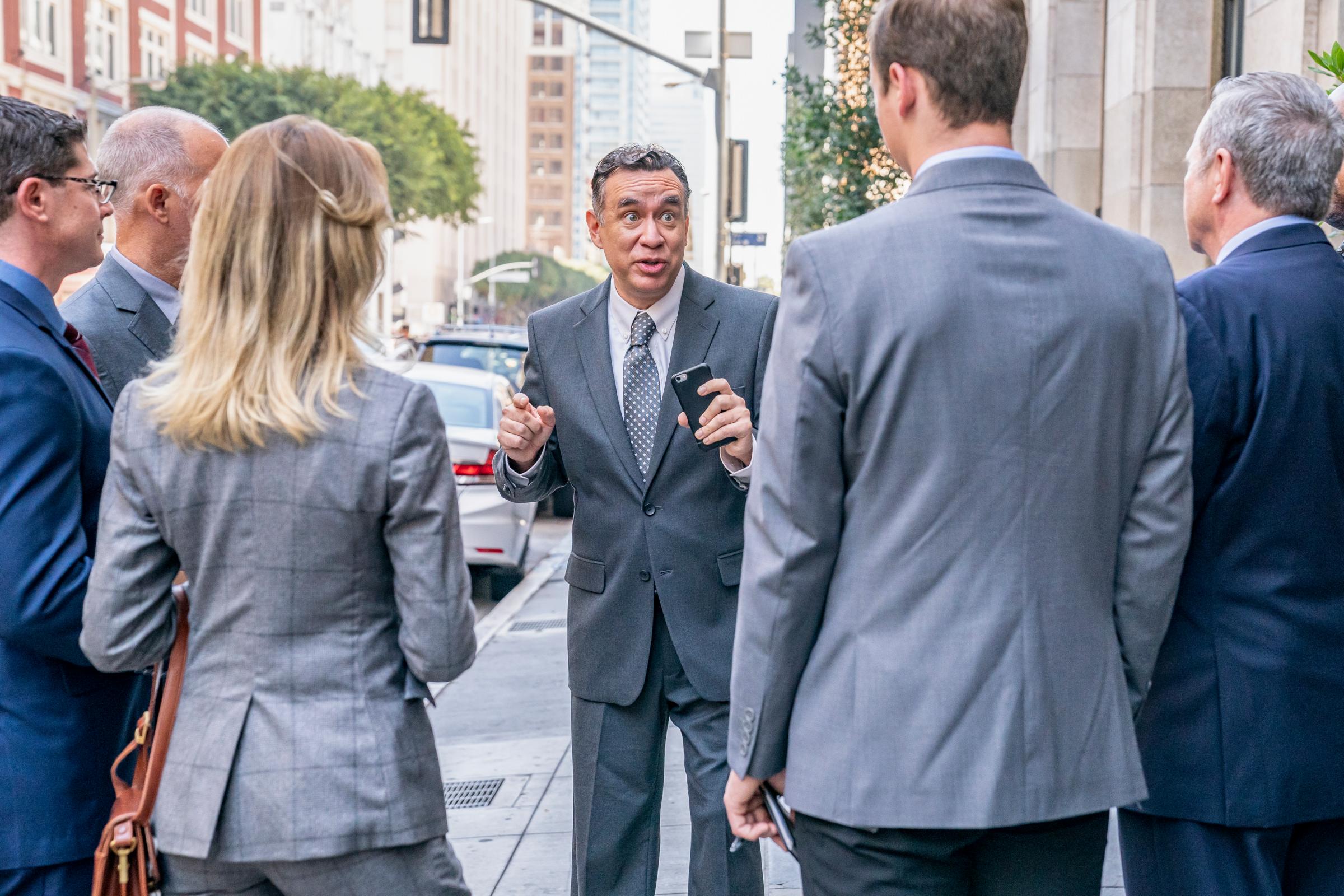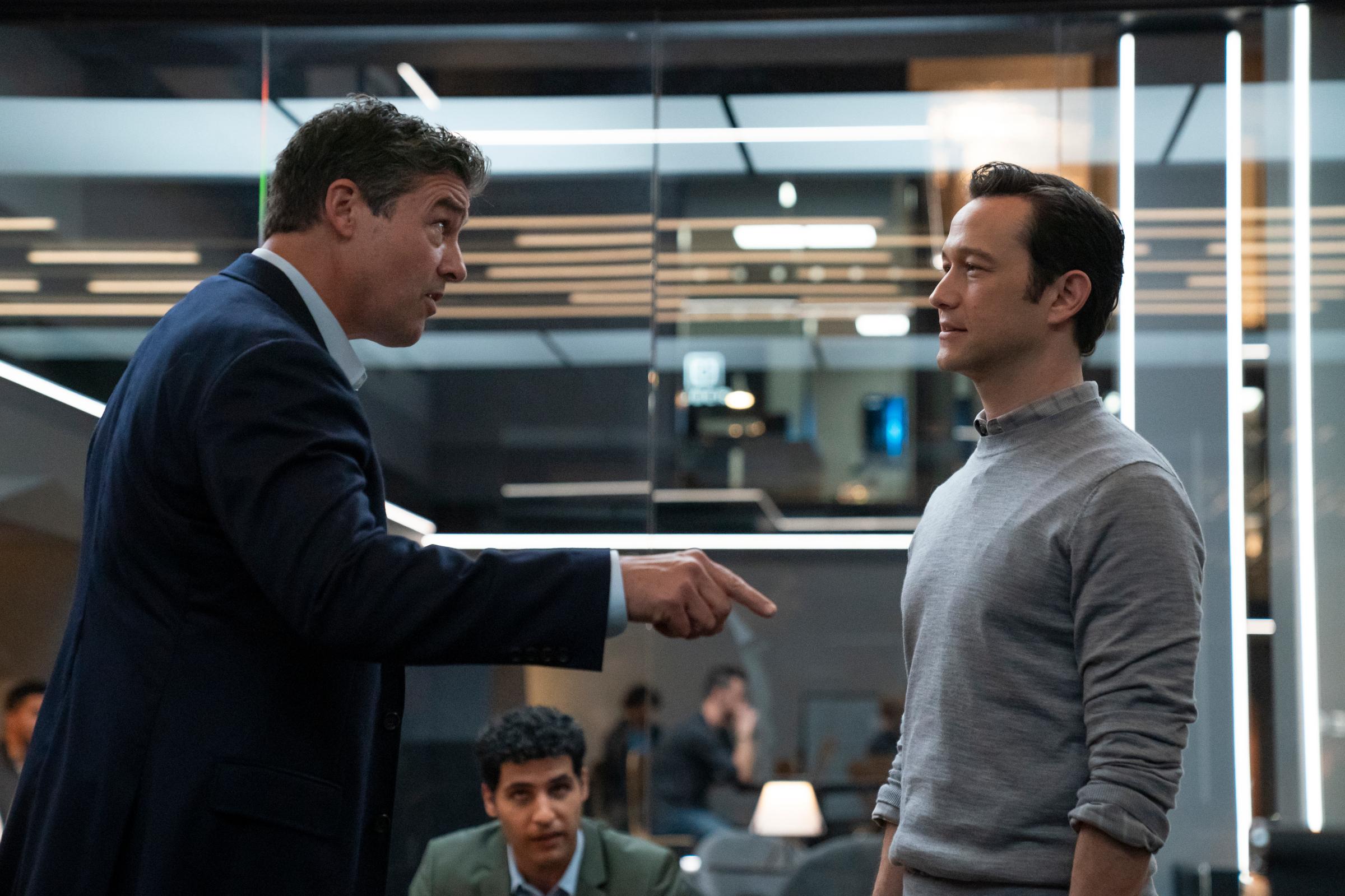Throughout the Showtime anthology series Super Pumped: The Battle for Uber, premiering Feb. 27, the ride-share company’s former CEO Travis Kalanick (played by Joseph Gordon-Levitt) is compared to cult leader David Koresh. Mike Isaac, the author of the titular 2019 book that inspired the eight-episode series, doesn’t recall any of his sources equating the embattled one-time Uber boss with the man who played a central role in the 1993 Waco massacre. But he admits it’s an apt comparison, if not a compliment.
“In Silicon Valley, ‘cult’ is not a dirty word,” says The New York Times tech reporter who has been covering Uber since 2014. (He’s also an executive producer on Super Pumped, as well as the show’s resident researcher and fact-checker.) “If you think about it, most startups fail. Everyone is pretty much rooting against you. The person at the head of the company has to be a true believer in what they’re doing.”
Beyond just believing in Uber’s potential, Kalanick was committed to its mission to a fault. The series, created by Billions’ Brian Koppelman and David Levien, shows how Kalanick’s blind faith in himself and the company he co-founded in 2009 drove his success, but also led to his demise. In 2017, Kalanick resigned as Uber’s CEO amid a myriad of scandals that included allegations of workplace discrimination and sexual harassment under his leadership. (He remained on Uber’s board of directors until 2019, the same year the company went public.)
Yet Super Pumped never paints Kalanick as a mustache-twirling villain. Instead, it offers an unvarnished look at the man Isaac once called “Mark Zuckerberg meets a can of Axe Body Spray.” “Travis is a complicated, nuanced, flawed person who fought like hell to bring this industry to light,” Isaac says. “But schadenfreude is real. I think people like stories in which aspirational figures fly too close to the sun. Travis did that, too.”
Below the author helps fact-check the series that looks at the rise and fall of Kalanick as he built one of Silicon Valley’s most successful—and destructive—companies.

Did Travis Kalanick really start off every Uber job interview by asking, ‘Are you an a–hole’?
When viewers first meet Travis he’s asking a prospective new hire a very important question: “Are you an a–hole?” The takeaway is that nice guys finish last at Uber. So if you want to work there, you better answer “yes” to his query. Isaac doesn’t believe Kalanick or anyone else who worked for the company ever said those words.
“The recruiters probably had enough self-awareness to not ask, ‘Are you an a–hole’ in a job interview,” he says. “But they definitely made it clear to people that this was not play time, this was a tough job, a daily fight. If you wanted to sign up at Uber, you had to know what you’re getting into.”
Super Pumped uses the provocative question to foreshadow the pitfalls of Kalanick’s overly aggressive leadership style. He could get away with being a bit of an a–hole back when he was a David taking on Silicon Valley’s Goliaths. But once Uber became the company to beat, he couldn’t continue acting like a scrappy upstart. “The best CEOs change and mature over time,” Isaac says. “They are able to take guidance from mentors and change the way the company operates, but I think Travis really only had one mode, which was ‘go as hard as possible.’ Had he been able to drastically change how he operated, maybe he would still be there.”
Did Uber create a tool that secretly denied service to riders?

In episode 2, Travis and his team launch “Greyball,” a secret program that punishes riders that the company deems persona non grata by forcing them to schedule “ghost cars” instead of real ones. “It’s like a video game and we have the cheat code,” Travis says giddily as he watches a transportation agent hellbent on shutting down the company’s operation in Portland, OR. (played by Fred Armisen) fail to book a ride.
In 2017, Isaac broke the story of Greyball for The New York Times. He says the “paranoid tool” used data collected from the Uber app to evade authorities in cities like Boston, Paris, and Las Vegas, as well as countries like China, Australia, and South Korea. As early as 2014, the company started using the tool, which was part of a program called VTOS, short for “violation of terms of service.” Greyball had been approved by Uber’s legal team but, in 2017, the United States Department of Justice launched an inquiry into the legality of it based on Isaac’s reporting.
At the time of Isaac’s story, Uber claimed the tool “denies ride requests to users who are violating our terms of service — whether that’s people aiming to physically harm drivers, competitors looking to disrupt our operations, or opponents who collude with officials on secret ‘stings’ meant to entrap drivers.” Less than one week later, Uber said it would review how the technology was being used, but would “expressly prohibit its use to target action by local regulators going forward.”
Did venture capitalist Bill Gurley make an enemy of Travis Kalanick after implying Uber was a “dead unicorn”?
In episode 3, Uber board member Bill Gurley (Kyle Chandler) sits down with a journalist (Isaac making his acting debut) at the South by Southwest conference and takes aim at the ride-sharing company. When asked whether he thinks Silicon Valley is in a “tech bubble,” Bill says, “I think we’re in a risk bubble especially with these so-called unicorns,” a term used to describe startup companies like Uber that have a valuation of over $1 billion. He then says that some of those unicorns are “acting irrationally” and there “isn’t enough fear in Silicon Valley,” before adding, “I think you will see some dead unicorns this year.” His comments result in Travis revoking his all-access privileges to the Uber office.
At the 2015 SXSW festival, Gurley did suggest, without naming any names, that there would be some “dead unicorns” in the near future. The partner at the venture capital firm Benchmark has a reputation for being a pessimist—Kalanick called him “Chicken Little” behind his back, according to Isaac—but his statements raised eyebrows. “What he said definitely applied to Uber. It was subtly or not so subtly aimed at them,” Isaac says. “People on the inside at Uber felt that too. That it wasn’t an accident that he’s saying this stuff.”
Gurley didn’t lose his key card for what he said—though, he would later have the electronic pass taken away for unspecified reasons—but it may have foreshadowed the fallout to come. While Gurley and Kalanick seemed simpatico at first, the combo of the young CEO’s shenanigans and the veteran VC’s worries didn’t make for a good marriage. “By the end, they weren’t talking to each other at all directly. They had to have intermediaries,” Isaac says. It’s Gurley who reportedly spearheaded the call for Kalanick to resign in 2017, enacting a coup of sorts. One day after Kalanick stepped down as CEO, Gurley left Uber’s board of directors.

Did a former Uber employee write a viral blog post about worker discrimination over a leather jacket?
In episode 5, a site reliability engineer (SRE) named Susan Fowler gets to lay out the toxic culture that permeates the Uber workplace by detailing her own experience at the company. On her first day, she says she was sexually harassed by her superior. When she reported the incident to Marie in HR, she was told to switch teams so she wouldn’t have to work with her harasser who was likely to give her a poor performance review if she stayed. While her new boss wasn’t a pervert, he wasn’t interested in giving her the promotion she deserved—or the leather jacket that all SREs were promised but was only given to the men. After leaving the company, she wrote a blog post detailing her “very, very strange year at Uber.”
The allegations above were covered in detail in Fowler’s February 2017 blog post including the leather jacket debacle. Fowler claimed that the six female SREs on staff received a “comically absurd” email from her director saying the company could not justify placing a jacket order for so few women at such a high cost. When she rebuffed his excuse, “the director replied back, saying that if we women really wanted equality, then we should realize we were getting equality by not getting the leather jackets.”
“To Susan’s absolute credit, [her blog] blew the lid off the long simmering issues of dysfunction inside of Uber and Silicon Valley,” Isaac says. Her speaking out led to some quick changes: Uber launched an independent investigation into its workplace culture, Kalanick resigned, and the company ousted at least 20 other employees for sexual misconduct. It’s easy to forget that Fowler’s blog went live eight months before the #MeToo movement started. “Susan’s story was kind of a precursor to a really large movement that would hit across the country and across the world later that year,” Isaac says. “Her blog was enormous in The Valley, but it was really part of a continuum that would take off after the Harvey Weinstein allegations.”
In 2017, Fowler was named Time’s Person of the Year alongside other “silence breakers” including Taylor Swift, Ashley Judd, and activist Tarana Burke, who coined the term #MeToo. Three years later, Fowler released her memoir, Whistleblower: My Journey to Silicon Valley and Fight for Justice at Uber.
Was Arianna Huffington like a mother to Travis Kalanick?
In episode 4, Travis meets the Huffington Post co-founder, played by Uma Thurman, at a contentious tech conference. He finds a much-needed ally in Arianna just as his relationship with Gurley begins to sour. She shows him how to center himself through meditation and becomes a board member he can count on when he feels outnumbered. She sticks with him through the most tumultuous of times for the company and later becomes a mother figure to Travis after his mom (Elisabeth Shue) dies in a tragic boating accident.
The cozy relationship viewers see on screen was true to real life. “I think Arianna was very important to him,” Isaac says. “She was on his side at a time when he was losing friends and making enemies.” After his mom died unexpectedly in 2017, Huffington became “an emotionally supportive figure during the most stirring periods of his entire life,” Isaac says.
After Susan Fowler accused the company of sexual discrimination and harassment in 2017, Huffington was put in charge of the independent investigation into Uber’s workplace culture, a questionable move considering her close relationship with Kalanick. Amid the investigation, she also became the face of Kalanick’s redemption tour, telling CNBC in June 2017 that through self-care he would become a better leader. “So first, Travis started recognizing how differently he made decisions when he had gotten enough sleep,” she said. “And then he started meditating.”
Her guidance would prove inconsequential; Kalanick would resign as CEO that same month. Two years later, Huffington resigned from Uber’s board seemingly unscathed. “What I really admire about her is she always seems to be able to see around corners and know what’s coming,” Isaac says. “That’s why she’s made it so far, she’s basically Teflon.”
Did a viral video of Travis Kalanick yelling at an Uber driver end his career?
In episode 5, viewers meet Fawzi Kamel, an Uber driver who was verbally harassed by Travis after taking him home from a club. The altercation was caught on his dash cam, but Fawzi is torn as to whether he should release it. He doesn’t want to punish Kalanick for having a bad day and doesn’t want to lose his job. He only decides to release the clip after learning that Travis plans to invest in self-driving cars.
The real Kamel, who had been driving for Uber since 2011, was taking Kalanick home in February 2017 when he confronted the CEO over lowered fares that made it hard for him to make a living wage. Instead of showing empathy for his employee, Kalanick went on the defensive. “Some people don’t like to take responsibility for their own sh-t,” he says in the clip. “They blame everything in their life on somebody else.”
At the time, Kamel told NBC News that he released the footage because he wanted to show how little Kalanick cared about his workforce. “Uber kept dropping prices every season to gain more ridership to satisfy their growth, and it didn’t matter to Uber if the driver is not even making minimum wage,” he said in February 2017. “And the worst part is, they call us partners, [but] they make the rules, set the price and they even choose the cars you can use.”
In his book, Isaac writes that the viral video led Kalanick to have an “epic meltdown” that had him questioning his character. “You aren’t a terrible person,” a member of Kalanick’s PR team allegedly told him. “But you do do terrible things.” Kalanick apologized to Kamel and reportedly later met with him in person to say he was sorry. But the video, which came one week after Fowler’s viral blog post, became just another example of the CEO’s questionable leadership style. “I think the video really showed a lack of regard for the people who make his service,” Isaac says. “It became difficult for him to survive if the public thought he didn’t care about his drivers. It was definitely one of the last nails in the coffin.”
Kalanick may no longer be at Uber, but he’s planning a comeback with a new startup called CloudKitchens, which rents out space to restaurants for delivery-only services. He claims it will be “bigger than Uber.”
More Must-Reads From TIME
- Dua Lipa Manifested All of This
- Exclusive: Google Workers Revolt Over $1.2 Billion Contract With Israel
- Stop Looking for Your Forever Home
- The Sympathizer Counters 50 Years of Hollywood Vietnam War Narratives
- The Bliss of Seeing the Eclipse From Cleveland
- Hormonal Birth Control Doesn’t Deserve Its Bad Reputation
- The Best TV Shows to Watch on Peacock
- Want Weekly Recs on What to Watch, Read, and More? Sign Up for Worth Your Time
Contact us at letters@time.com